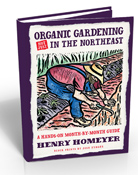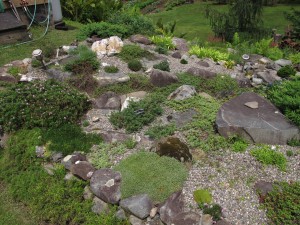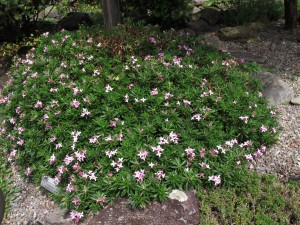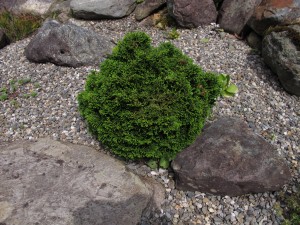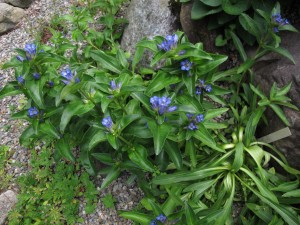Rock Gardens
Many plants that do well in rock gardens originally come from places with extreme growing conditions such as deserts or the rocky slopes of mountains. Most have tight foliage, low profiles and deep tap roots to keep from blowing away when the wind blows. But generally in those difficult locations, pollinators are few and far between. In order to attract them, these plants favor big flowers (in relation to the size of the plants), bright colors and strong scents. “Hey, it’s me! Come visit!” they seem to be saying with their floral displays. And those flowers also attract gardeners who are willing to tend them, pull weeds and build soils to their particular needs.
I recently visited Lisa Palmer and Dan Drew in Plainfield, NH where they have a splendid rock garden. In fact, Lisa is so avid a rock gardener that she was one of just 5 Americans who attended the Second International Rock Garden Society’s meetings in Czech Republic this May.
I asked Lisa what is critical for success with a rock garden. Without pausing to think, she said, “Perfect drainage.” Rich soil and lots of compost? Save it for the veggies. Good rock gardens are made with sandy soil and very little organic matter.
Seventeen years ago Lisa and Dan started a rock garden after they had an artesian well drilled which provided them with plenty of sand and ground rock. Dan enjoys hard physical labor, so he agreed to dig out the existing soil in the area where the rock garden was planned and spread the sandy, gravelly mess.
Dan dug out 18 inches of soil, replacing it with coarse sand and gravel. He also moved some good –sized river stones up to the garden, which gave it some “bones” to work with. Their subsoil was well drained and somewhat sandy, which was good for a rock garden. Lisa explained that you must work with what you have. If you have a heavy clay soil and live in a low place, you can’t easily create a rock garden.
Many of the plants in the rock garden of Dan and Lisa are related to plants I know, but not species I can grow in my rich garden soil. They have a number of kinds of daphne including rose daphne (Dapne cneorum) and a lovely hybrid in bloom right now, Daphne x schlyteri. This is an evergreen daphne that grows to just 8 to 12 inches tall and roughly twice as wide – much smaller than the daphne I grow. The leaves are narrow and dark green; they grow out from each stem like spokes on a series of increasingly large wheels. The flowers are small, pink and highly fragrant.
Dwarf conifers are the backbone of many rock gardens as they are slow growing and are as beautiful in winter as they are in summer – and perhaps more so, as they contrast nicely against the snow. One that Lisa and Dan use effectively is hinoki cypress, also called hinoki falsecypress (Chamaecyparis obtusa ‘Nana’).Whenever you see “Nana” in a scientific name ti means that the plant stays small – just like my grandmother, who we called Nana.
Hinoki cypress reminds me of a something from the sea, perhaps a type of coral or seaweed. Its dark green foliage forms twisting fan-shaped little branches in dense tiered layers. It is hardy to Zone 4 – if it has the proper growing conditions: moist, well drained soil. It can grow to a foot or two tall and up to three feet wide. I’ve tried growing it without success – I somehow can’t plant something and not give it compost.
Gentians are good rock garden plants. I grow a nice fall blooming gentian, one called Gentiana makinoi ‘Marsha’ which blooms in ordinary garden soil with sky-blue flowers in September. Blooming now in their rock garden is one called star gentian (Gentiana cruciata.) In the spring they have others called Gentiana acaulis and Gentiana vern – plants that Lisa consider the gems of the genus. Both have wonderful blue flowers.
Cactus does well in rock gardens, some surviving in Zone 4 (with winter temperatures dropping to minus 30 degrees F on occasion). Prickly pear cactus (Opuntia spp.) grows well for Lisa and Dan, spreading to form small colonies. Sedums and hens and chicks also do well.
Lewisia is another genus of rock garden plant they like. Originally observed in 1806 by Meriwether Lewis of the Lewis and Clark Expedition, it needs very fast drainage to avoid rotting the root (which is edible, though since the common name of Lewisia is “bitterroot”, it is not likely to grace my table). The rosette –shaped flowers come in a variety of cheerful colors.
Maintaining a rock garden is a labor of love. Common weeds can choke out or overcome some rock garden plants unless you keep after them. Dan told me that he mulches most areas with pea stone (3/8 inch smooth gravel). It gets very hot in summer, effectively burning off young weeds. Still, I’m not ready to commit to creating and maintaining a rock garden. Well maybe … after I retire.
Henry Homeyer is a gardening consultant, public speaker and the author of 4 gardening books. His web site is www.Gardening-Guy.com. He lives in Cornish Flat, NH.

